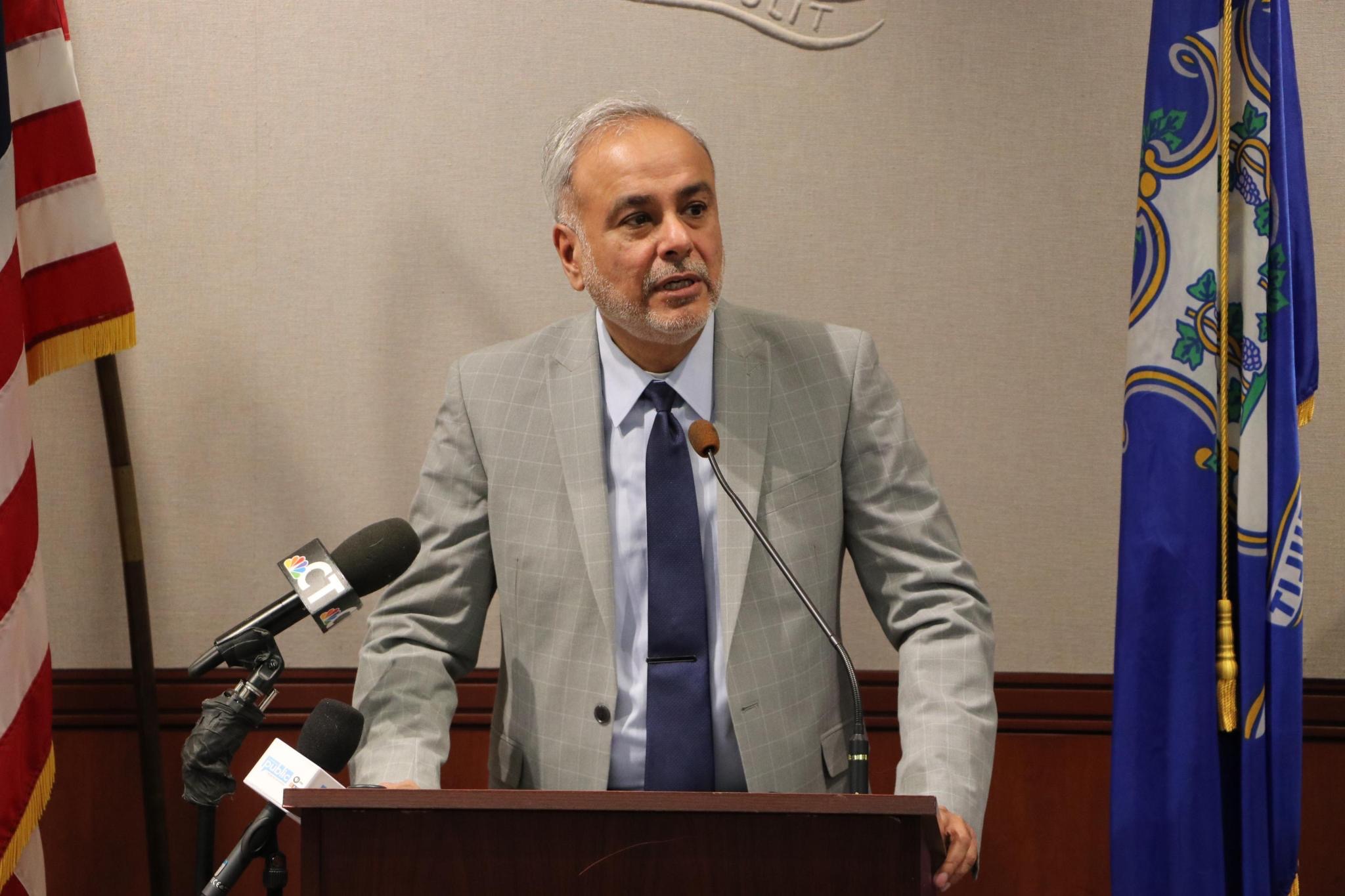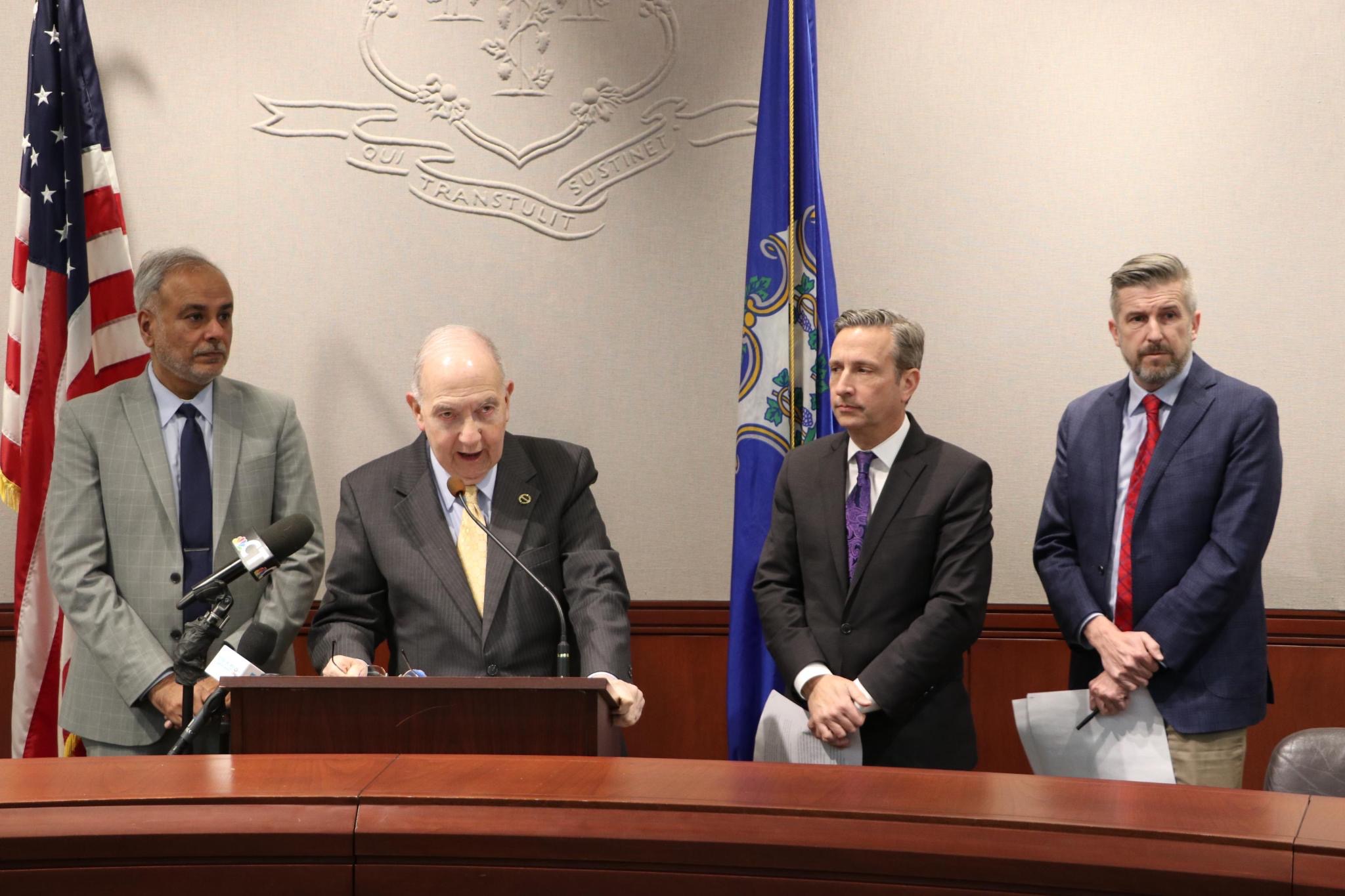
On Day One of Trump 2.0, Senate Democrats Announce Protections for Public Health and Consumers
On the first full day of the new President Trump administration, Connecticut Senate Democrats announced a priority bill intended to enact new consumer protections aimed at affordability and a public health proposal designed to shield Connecticut from impending federal policy changes that could threaten the health of state residents.
Senate President Martin Looney (D-New Haven) and Senate Majority Leader Bob Duff (D-Norwalk) joined Sen. James Maroney (D-Milford) and Sen. Saud Anwar, D-South Windsor, in announcing Senate Bill 3, An Act Concerning Consumer Protection and Safety, and Senate Bill 7, An Act Concerning Protections for Access to Health Care and the Equitable Delivery of Health Care Services in the State. More details on both bills are below.
Senate Bill 3: An Act Concerning Consumer Protection and Safety
Connecticut families have struggled with the affordability of goods and services for the last several years as a result of inflation and supply chain disruptions related to the pandemic. However, some corporations have used these conditions as a pretense to extract additional profits from hardworking families through a form of price gouging that occurs before the product is ever placed on a store shelf.
Although Connecticut currently has laws to prevent price gouging, these policies have two critical limitations: they can only be enforced against retailers, and they only apply during major disasters or when an emergency has been declared. In other words, price gouging is essentially permitted in all but the most dire circumstances.
Through Senate Bill 3, Senate Democrats plan to target the kinds of price gouging that drive up costs behind the scenes as manufacturers, distributors, wholesalers and suppliers artificially inflate prices to pad their bottom lines.
The legislation will also expand the scope of Connecticut’s price gouging prohibition beyond emergency situations by allowing the attorney general to issue notices of abnormal economic disruption. These notices would apply to significant interferences in the production, distribution, supply, sale or availability of necessary consumer goods like diapers, baby formula, or prescription medications.
The proposal gives the attorney general the authority to enforce the new price gouging prohibition under the Connecticut Unfair Trade Practices Act.
“We are committed to making life more affordable for Connecticut families by addressing the practices that unfairly drive up costs,” Senator Looney said. “Price gouging shouldn’t be prohibited only during declared emergencies—it’s a harmful practice that burdens consumers at any time. This legislation will ensure fairness and accountability up and down the supply chain, so that residents aren’t exploited when they shop for essential goods.”
“We spent months knocking on doors, listening to the concerns of our constituents, and the message was clear: Connecticut residents are deeply frustrated with the rising cost of goods and services,” Senator Duff said. “Rather than just talking about the problem—or worse, proposing tariffs that economists agree would make life even more expensive—Senate Democrats are taking decisive action. With this bill, we’re ensuring that consumers aren’t exploited by corporations taking advantage of economic disruptions to pad their profits.”
“Connecticut families are struggling with the rising costs of everyday essentials, and it’s clear that affordability isn’t just a problem during emergencies,” said Senator Maroney, co-chair of the legislature’s General Law Committee. “This bill will help prevent unfair price hikes year-round by holding corporations accountable for driving up prices when they aren’t justified. It ensures that families won’t have to bear the burden of inflated costs, especially when they’re already stretched thin.”
This year’s legislation represents a continuation of anti-price gouging work begun in 2024, when Senate Democrats drafted amendment language to Senate Bill 3, which would have prohibited distributors, manufacturers, suppliers and retailers from increasing their prices if the new rate would have been grossly disproportionate compared to previous prices or the hike could not be attributed to costs incurred by the vendor.
The bill includes other new consumer protection measures, like a disclosure requirement to address “shrinkflation,” a practice used by manufacturers to reduce a product’s contents without changing its packaging size or price. For example, a box of cornflakes may contain less cereal but generally appear the same, leaving consumers unaware that they are paying more per ounce for the product. Senate Bill 3 would require clear and conspicuous disclosures of such reductions to ensure Connecticut families are informed about price increases.
Additional provisions of Senate Bill 3 will:
-Protect consumers from junk fees by generally requiring advertisements to present customers with upfront pricing that does not hide additional fees.
-Address eavesdropping by preventing companies from using their products to listen to or view consumers without their express permission.
-Create a right to repair products by requiring companies to make consumer tools and parts available to ensure their products can be repaired by people who are not associated with the company.
-Address security concerns related to drones manufactured in China and Russia by prohibiting state agencies from purchasing or using the technology unless they have applied for certain limited waivers.
-Require Connecticut municipalities to use “.gov” web domains by July 1, 2026 and connect towns and cities with federal grants to assist with this transition.
Senate Bill 7: An Act Concerning Protections for Access to Health Care and the Equitable Delivery of Health Care Services in the State
Senate Bill 7, “An Act Concerning Protections For Access To Health Care And The Equitable Delivery Of Health Care Services In The State,” seeks to serve as a shield to preserve Connecticut public health against potential significant shifts in the direction of federal health agencies with the new Presidential administration taking power. Officials newly in power have made a number of claims and statements regarding their intended direction for American public health, which may operate in contrast to and in opposition to the best interests of Connecticut residents.
Fluoridation
The United States first began adding fluoride to drinking water in the 1940s, an approach that by 1999 was named one of the ten greatest public health achievements of the 20th century by the Centers for Disease Control and Prevention by reaching more than 140 million Americans. Fluoride prevents tooth decay in children and adults, with reduction rates of up to 70% for children and 60% for adults, and, as oral health has consequences for overall physical health, its use has saved lives and improved health outcomes for countless individuals.
Robert F. Kennedy Jr., nominated to become the Secretary of the federal Department of Health and Human Services, has previously stated his interest in removing fluoride from drinking water as a main priority if confirmed. He has cited studies that claim fluoride exposure harms children’s health and development, though those studies have been challenged Trump and disputed by medical professionals. Cities including Juneau, Alaska and Canada’s Windsor, Ontario have previously removed fluoride from community drinking water, and in following years saw increased need for dental care among children. In Windsor, Ontario, tooth decay increased by as much as 51%.
Announced plans to remove fluoride from drinking water led to stocks rising among dental services companies, CBS News reported in November.
Senate Bill 7 seeks to maintain the amount of fluoride in Connecticut water supplies. Current state law is to maintain an average monthly fluoride content that is not more or less than 0.15 mg/l different than the United States Department of Health and Human Services’ (HHS) most recent recommendation which is currently .7. Senate Bill 7 would simply preserve that standard in state statutes in the event HHS removes or changes that standard.
Public Health Urgent Communication Fund
Misinformation and disinformation related to the previous Trump administration have contributed to erosion in public trust regarding public health communications. In 2020, a research study at Cornell University found that nearly 38% of all misinformation in the first five months of the global spread ofCOVID-19 was related to statements or comments published by President Trump. Alarm continues over individuals including Robert F. Kennedy Jr. and statements they’ve made regarding commonly accepted medical advances and treatments; most prominently, Kennedy has cited long-debunked claims that vaccines are tied to increased diagnoses of autism spectrum disorder and he has earned millions of dollars from a nonprofit he founded that publicly opposes vaccines.
Senate Bill 7 seeks to establish a public health urgent communication fund to provide clear and rapid release of urgent health information to the general public, with an initial funding total of $5 million.
Emergency Public Health Safeguard Fund
Concerns that the new Trump Administration will slash public health support nationally and for states are based on his first term. His proposed budgets for 2017 and 2019 sought to slash billions from health funding programs and sought to end insurance coverage for millions of Americans, which would have cumulative effects adding increased pressure to public health needs.
Senate Bill 7 would establish an emergency public health financial safeguard fund that would be used in cases of emergency to address unexpected shortfalls in public health funding and to ensure the state Department of Public Health can continue to respond to residents’ health care needs and provide essential health care services. An initial proposed amount for this fund would be $30 million.
Active Ingredient Imports
Concerns about the legality of abortion drugs and other medications in the new Trump administration stem from uncertainty. A lawsuit brought by Idaho, Missouri and Kansas lawmakers seeking to restrict access to mifepristone, often used in reproductive healthcare that can induce abortion, is ongoing despite a previous Supreme Court rejection; Trump said in June 2024 he does not want to ban the drug, said in August 2024 that he would support banning it, and said in December 2024 that he does not support a ban. Kennedy has additionally discussed creating “wellness farms” where people using drugs to treat conditions including ADHD and depression would be sent while casting scorn on the medications.
Under SB7, the general statutes would be amended to authorize the import of active ingredients of drugs like levonorgestrel, mifepristone and misoprostol to ensure production can occur locally and access can be retained in the event of a larger ban. The bill may also seek to allow compounding pharmacies to compound ingredients for the purpose of ensuring residents may access them.
Public Health Advisory Body
In addition to misinformation spread during the COVID-19 pandemic by Trump, further concerns about public health messaging and decision-making relates to his past history of comments on health concerns. CNN reported in 2020 that Trump has spread debunked claims and false information about public health issues including AIDS, flu vaccines and autism, swine flu, Ebola and the spread and impact of illnesses from the 1990s to the 2020s.
Senate Bill 7 would establish a Public Health Advisory Body within the Department of Public Health, providing current DPH Commissioner Manisha Juthani with a board of trusted, experienced public health experts who could provide advice and guidance should future national public health decisions counter widely accepted medical advice.








